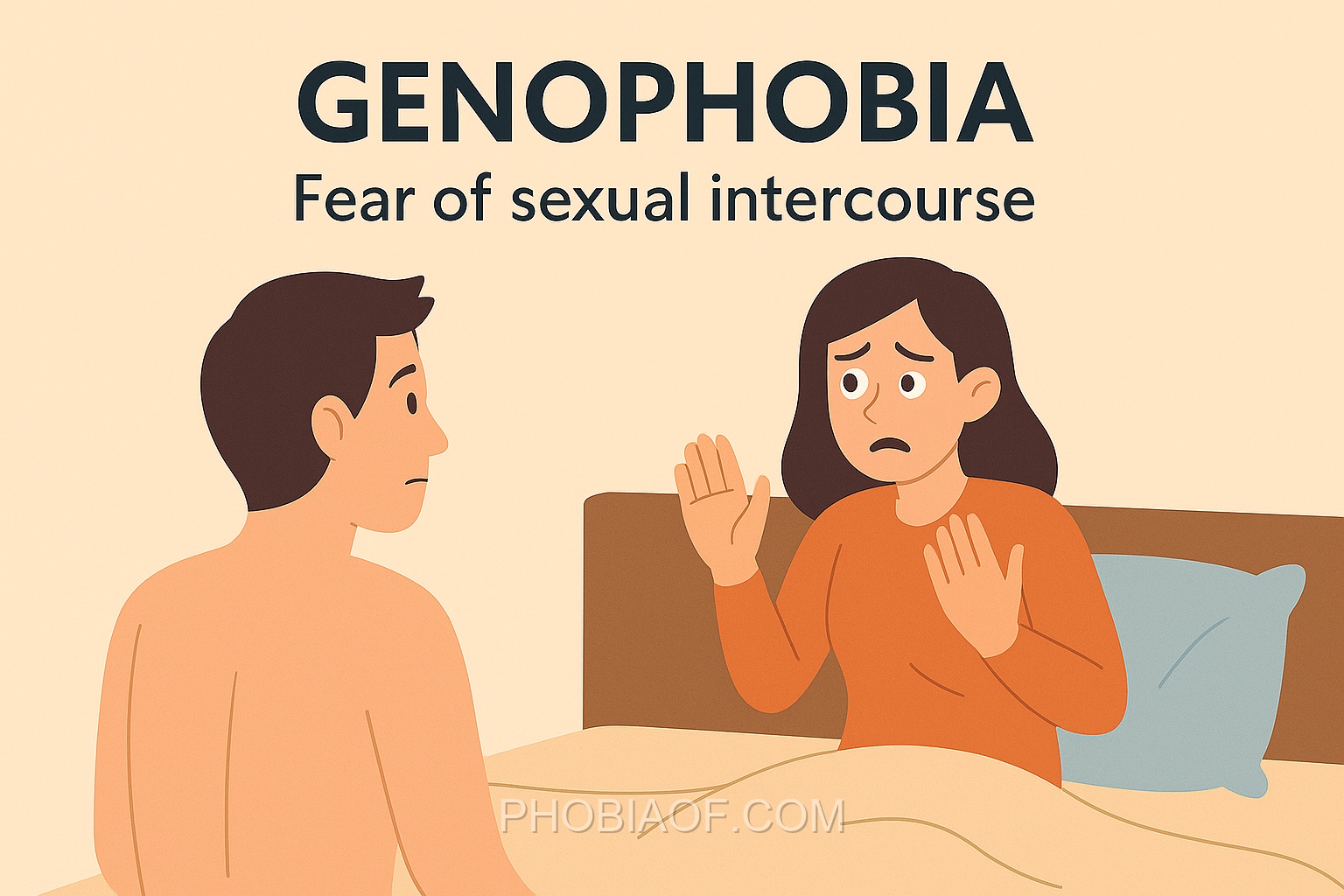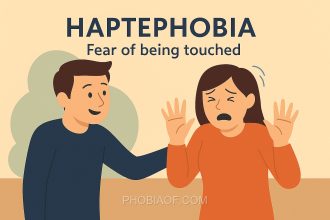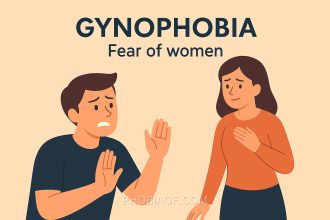Have you ever heard of genophobia? It’s a term not commonly discussed, yet it’s a reality for many people. Imagine feeling an overwhelming fear at the thought of sexual intimacy. This is what those with genophobia experience.
In simple terms, genophobia is the intense fear or anxiety associated with sexual intercourse. The word originates from the Greek words “genos,” meaning “offspring” or “birth,” and “phobos,” meaning “fear.” This phobia can manifest in a variety of ways, impacting not just physical intimacy but also emotional connections and relationships.
People with genophobia often experience:
- Extreme anxiety or panic attacks when faced with the thought or act of sexual intercourse.
- Avoidance of situations where sexual activity might be expected or implied.
- Struggles with personal relationships due to the avoidance of intimacy.
The effects of genophobia can be profound, influencing both mental health and social interactions. Those affected might feel isolated or misunderstood, as societal expectations often place emphasis on sexual connections as a fundamental part of adult relationships. Understanding and compassion are key in supporting those who face this challenging fear.
Causes of Genophobia
Genophobia, or the fear of sexual intercourse, can have various underlying causes. Understanding these can help in addressing the phobia effectively. Below are some potential causes:
- Genetic Predisposition:
Some individuals may have a genetic predisposition to anxiety disorders, which can include specific phobias like genophobia. If a family member has a history of phobias or anxiety, it may increase the likelihood of developing similar conditions.
- Traumatic Experiences:
Past traumatic events related to sexual activity, such as abuse or assault, can lead to a lasting fear of sexual intercourse. Such experiences can have profound effects on an individual’s perception and emotional response to intimate situations.
- Learned Behavior:
Genophobia can also develop through learned behaviors. If a person grows up in an environment where sex is portrayed negatively or is associated with anxiety, they might internalize these attitudes and fears.
- Psychological Factors:
Other psychological issues, such as body image concerns, low self-esteem, or performance anxiety, can contribute to the development of genophobia. These can create a fear of being judged or rejected, leading to an avoidance of sexual situations.
- Environmental Factors:
Cultural or religious beliefs that frame sex as taboo or sinful can instill fear and anxiety about sexual intercourse. These beliefs can create internal conflicts and contribute to the development of genophobia.
Current research has explored various theories about the origin of genophobia. Some studies suggest that early negative conditioning and insufficient sexual education can play significant roles. Understanding these factors can aid in developing more effective treatments and interventions.
Symptoms of Genophobia
Genophobia is characterized by an intense fear or anxiety related to sexual intimacy. This phobia can manifest in various ways, affecting both the mind and body. If you or someone you know is experiencing these symptoms, it’s important to approach the situation with understanding and empathy. Here are some common symptoms:
Physical Symptoms:
- Panic attacks, which may include feeling a loss of control or impending doom.
- Excessive sweating, particularly in situations that involve or suggest sexual intimacy.
- Rapid heartbeat or palpitations when confronted with the idea of sexual activity.
- Shortness of breath or hyperventilation in response to triggers.
- Nausea or stomach discomfort when thinking about or encountering sexual situations.
Emotional and Behavioral Symptoms:
- Avoidance of any situations or discussions that may lead to or suggest sexual intimacy.
- Overwhelming dread or anxiety at the thought of sexual contact.
- Feelings of shame or guilt associated with the fear of sexual intimacy.
- Difficulty in forming or maintaining romantic relationships due to fear of sexual situations.
- Persistent worry or rumination about the fear of sex, even when not in triggering situations.
When severe, these symptoms can significantly interfere with daily life, making it challenging to maintain healthy relationships or enjoy a fulfilling social life.
Treatment for Fear of Sexual Intercourse
Genophobia, or the fear of sexual intercourse, is a condition that can be effectively treated and managed over time. It’s important to understand that you are not alone, and many people experience similar fears. With the right approach, you can overcome this phobia and lead a fulfilling life.
There are several proven therapies and coping strategies that can help you on this journey:
Therapies:
- Exposure Therapy: This therapy involves gradually exposing yourself to the object of fear in a controlled and safe environment. Over time, this helps reduce anxiety and fear associated with sexual intercourse.
- Cognitive-Behavioral Therapy (CBT): CBT focuses on changing the negative thought patterns and beliefs that contribute to your fear. By reframing these thoughts, you can reduce anxiety and build confidence.
- Counseling: Working with a therapist can provide a supportive space to explore the roots of your fear and develop personalized strategies to manage it.
Coping Strategies:
- Relaxation Exercises: Techniques such as deep breathing, progressive muscle relaxation, and visualization can help calm your mind and body.
- Meditation: Regular meditation practice can increase mindfulness and reduce anxiety, helping you gain better control over your fears.
- Support Groups: Connecting with others who have similar experiences can provide comfort, encouragement, and practical advice.
In some severe cases, medication such as anti-anxiety drugs may be prescribed by a healthcare professional. However, it is generally recommended to focus on therapy and coping skills as the primary means of treatment.
Remember, seeking professional help is a crucial step if this phobia is interfering with your life. A mental health professional can guide you through the process and tailor the treatment to your specific needs. With patience and perseverance, overcoming genophobia is possible.
Take the first step today, and know that support is available to help you on this journey to recovery.
Conclusion
Understanding the causes and symptoms of genophobia is a crucial step in addressing this phobia effectively. Recognizing the underlying factors that contribute to the fear of sexual intercourse can empower individuals to take proactive steps toward finding relief and healing. By being informed, you equip yourself with the knowledge needed to approach the situation with compassion and clarity.
It’s important to remember that many people have successfully overcome or managed their phobias, including genophobia, with time and the right support. The journey may seem daunting at first, but with patience and dedication, progress is entirely possible. Seeking professional help, such as therapy or consulting with a doctor, can provide invaluable guidance and strategies tailored to your personal experience.
Take heart in knowing that you are not alone, and there are resources available to help you navigate this challenge. Embrace the opportunity for growth and healing, and consider reaching out for support if you need it. Your path to a more fulfilling and fearless life is within reach.






